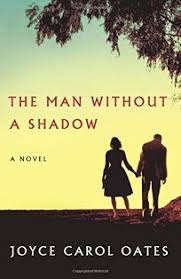The Man Without a Shadow by Joyce Carol Oates, USA, 2016
 This is a sad and, at times, frustrating book. At the centre is the man without a shadow – Elihu Hoopes (known as Eli) – who, after contracting a nasty viral infection while hiking on his own, has lost the ability to form new memories. The virus has damaged the hippocampus, and although Eli can remember some things from his past his ability to remember things in the here and now is limited to ninety seconds. If the person to whom he is speaking turns away or leaves the room for a couple of minutes, Eli loses all connection with the person and will, on their return, relate to them as a new person.
This is a sad and, at times, frustrating book. At the centre is the man without a shadow – Elihu Hoopes (known as Eli) – who, after contracting a nasty viral infection while hiking on his own, has lost the ability to form new memories. The virus has damaged the hippocampus, and although Eli can remember some things from his past his ability to remember things in the here and now is limited to ninety seconds. If the person to whom he is speaking turns away or leaves the room for a couple of minutes, Eli loses all connection with the person and will, on their return, relate to them as a new person.
Margot Sharpe, twenty-four, is a research scientist who is studying memory. She comes in contact with Eli, thirteen years her senior, when he is introduced to her as a research subject. She is, however, drawn to him by his appearance, his old-world politeness and mannerisms. Bit by bit, Eli becomes the centre of Margot’s professional career as well as the focus for her emotional needs. Used and abandoned by the head of the research department Margot transfers her hopes for an abiding relationship to Eli, the man who can only remember her for ninety seconds at the most.
As Margot writes in her journal: How do we know who we were, if we don’t know who we are? How do we know who we are, if we don’t know who we were? (Page 254)
A story about two lonely, frustrated individuals, each locked into different, but very limited and unsatisfactory, lives, A Man Without a Shadow examines not only emotions and obsession but also the influence of the past and the importance of memory. Eli remembers dark things from his past but he cannot give them meaning, while Margot is unable to liberate herself from her past.

A Man Without a Shadow can easily slip beyond the scenario of researcher and patient when we consider that it is not unusual for ordinary people to have difficulties remembering places, people, events. Sometimes the person boarding the train for a new life elsewhere may easily forget the huddle of people on the platform waving him/her goodbye as past memories become momentarily blocked by the vision of new, exciting experiences. The past and the present, both coloured and dictated by memory, can easily glide in and out of each other until, like Eli, we might say: Hello? Hel-lo?
A thought-provoking book, well worth reading.
Photo of Joyce Carol Oates from The Guardian